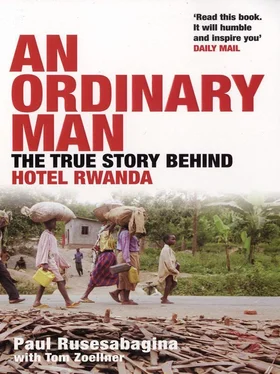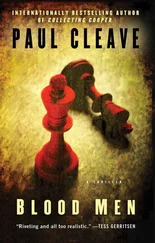I thought that over for about half a second before saying yes.
The application process was only a formality. The only thing I needed was a signature from a government minister, who had to personally approve all the scholarship recipients. And this was where I got my first real taste of the patronage system.
The rift in my country is not just between Hutus and Tutsis. There is also a rivalry between Hutus from the northern part of the country and Hutus from everywhere else. After President Juvenal Habyarimana came to power in 1973, a tight circle of his friends from the north part of the country, especially people with family ties in towns like Gisenyi and Ruhengeri, managed to dominate all the key cabinet posts and high-paying civil service jobs. The minister, of course, hailed from the north, and I fell into that category of Hutu that came from everywhere else. I was also a desk clerk, the son of a banana farmer. Nobody with any political connections, either. That made me nobody, period. He refused to sign my application. Of course, they would not say so directly.
“Has he gotten a chance to sign my application?” I asked the secretaries.
“He is still reviewing your application. You should have an answer soon.”
I went back every day for a week and got the same answer. All the other scholarship recipients received their signatures, but mine was in an endless state of review. It became clear that more was holding up my application than just the usual molasses of bureaucracy. Even though my career was on the line, I would not allow myself to get angry. I understood immediately that it was all about business. It was not as if the minister had anything against me personally. It was that the hotel scholarship was now a commodity-no different from a case of beer or a Honda motorcycle. If I took that last slot it would be one less favor he could do for a hometown relative or a political acquaintance. Giving his signature to me would have been giving it for free, because I had nothing to offer.
It was a dismal lesson in politics. But I will never forget the counterlesson I learned from Rossier when I told him I couldn’t go to the college after all.
“Oh, really?” he said. “Why not?”
“The minister will not sign my application.”
“I see, ” said Rossier. “Let me take care of things.”
My signature came that very afternoon. I found out later that a simple message had been conveyed: Either Paul gets your signature today or we will never offer hotel scholarships to anyone in Rwanda again.
It seemed that there were multiple ways to solve a problem. And I was a fast learner.
In Nairobi I learned many more things. I learned about the various wine-growing regions in France, and how to tell Bordeaux from Burgundy. I learned what separates a good Scotch from an excellent one. They sent me to Switzerland, where I learned even more about fine wine and food. I learned how to do bookkeeping, write a budget, manage a payroll, hire and fire, plan institutional goals. And I learned the art of performing courtesies without making a show of it. The idea is to not be noticed in the act of doing something nice for somebody, but, of course, people will notice. People always notice.
I grew in confidence as a manager, but my personal life was not so happy when I was at college. Time and distance took a toll on my marriage. Esther and I grew further apart, and we separated in 1981. I was granted legal custody of our three children, our daughters Diane and Lys, and our son Roger. It was a wrenching experience, one of the saddest periods in my life, but I was sure of at least one thing when I came back home to Rwanda. My career path was at last known to me. I would be a hotel man, not a preacher. The Hotel Mille Collines was something like an old friend to me by then. My troubles in marriage had made me bitter and hurt, but I threw myself back into my work with vigor and not a little bit of relief. It became my solace.
I have since come to realize that those years studying to be a churchman were not wasted at all. It was where I acquired knowledge that helped to shape my future. I gained an even greater understanding of human beings-what motivates them, where their failings are, where the good might be found that can trump the evil inside. Another thing the ministry teaches you is how to present a forceful case in language that everyone can understand. Learning to be a preacher makes you a better talker. That was one skill that would certainly come in handy in my personal life. I discovered, for example, that I had lost my shyness around girls.
One day in 1987 I was invited to a wedding. I have never been a good dancer and so I sat on the edge of the crowd, nursing a beer and watching people dance. I could not take my eyes off a particular woman in a white dress. She was the maid of honor. She had a shy smile that made my stomach turn over like an upended bowl of pudding. I cannot remember to this day what we talked about, but I remember thinking that her ideas were as fresh as her appearance. We exchanged phone numbers and said good-bye, but I did not forget her. I learned that Tatiana worked as a nurse in the town of Ruhengeri in the north. She happened to be a Tutsi. I could not have cared less about that, but other people certainly did. She was suffering a huge amount of prejudice at her workplace and she wanted to leave.
At last, a matter of the heart where I knew what to do! I went straight to work. The minister of health was a frequent guest at the poolside of the Mille Collines and I arranged a favor. Tatiana soon received a transfer to Central Hospital in Kigali. By that time my divorce was final and I was a free man. I courted my new girlfriend assiduously and we married after two years. Diane, Lys, and Roger accepted Tatiana as their new stepmother almost immediately. Tatiana conceived and gave birth to a daughter, who perished before she could be given a name on the eighth day, according to the Rwandan custom. It made us all grieve. But before long, my wife was pregnant again and we brought my son Tresor into the world. And I settled into a loving family life, feeling like a complete husband and father once more.
My stock continued to rise at the Mille Collines, where I was made an assistant general manager. They gave me an office of my own, as well as the authority to dispense little perks here and there to favored guests. An Army general who came in frequently would get a free cognac, or perhaps a lobster dinner. It made them feel appreciated, which is a universal hunger among all human beings. The gifts were also an indication of their status in front of whatever companion they had brought in. This helped to not only cement their fidelity to the hotel, but to make them appreciative to me personally. If we had an important diplomatic visitor, I would give them the royal welcome at the front roundabout, asking them in courtly European tones about their trip and telling them we had a very nice room waiting for them, even when it was occasionally not so nice.
I learned to take my morning coffee not in my office but down at the poolside bar. At 10:00 A. M. some of the capital’s big shots would start to drift in. Some of them came in alone with reams of paperwork. Others brought their friends and coworkers. Most had the thick Rwandan coffee, some breakfasted on beer. The talk was a stew of personal chitchat and government business. I don’t know why so many of them thought of the Mille Collines as an office out of the office. Perhaps the walls had ears at their ministries. Perhaps it just felt more relaxed here. Whatever the case, an astonishing number of decisions were made next to the pool, and I watched it all happen from my perch at the bar. I learned to tell from subtle body language whether I should approach a table for some welcoming banter or whether it was best to remain invisible.
Читать дальше











![Paul Finch - A Wanted Man [A PC Heckenburg Short Story]](/books/702381/paul-finch-a-wanted-man-a-pc-heckenburg-short-sto-thumb.webp)
